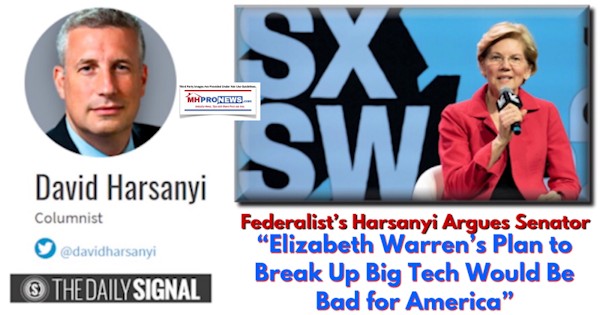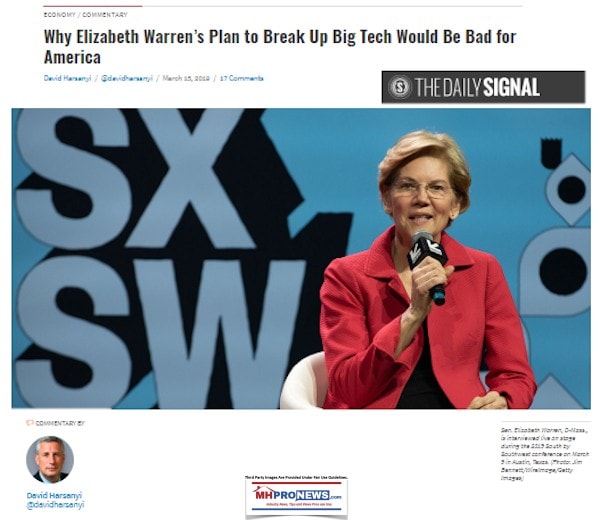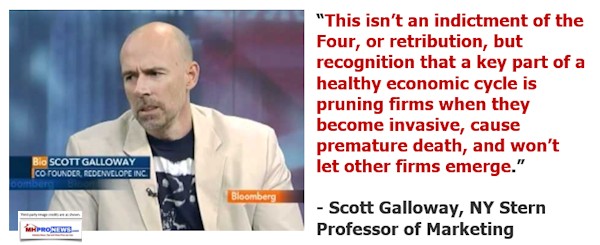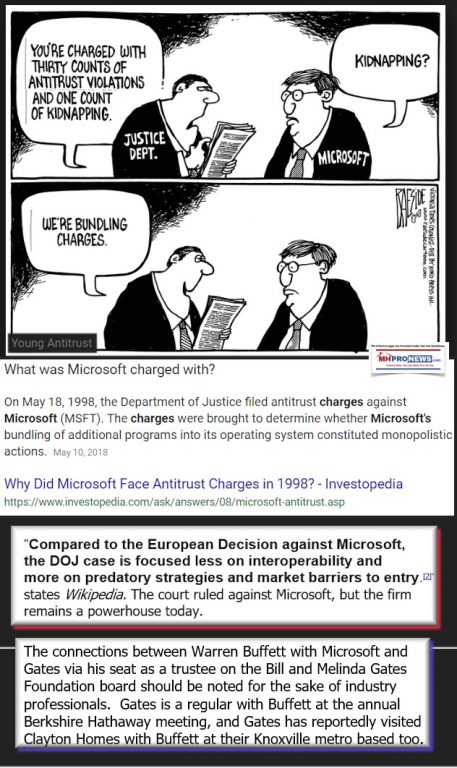
The debate over the breakup of big mega-powerful corporations is heating up. In the American Republic, a healthy exercise of thoughtful free speech is a good thing.
Many of those discussions start with a call to break up Big Tech, which voices on both sides of the left-right political aisle have been calling for with an increasing sense of urgency. Google, and Facebook certainly have a direct impact on manufactured housing every minute of every day, given their dominating presence online. Other tech giants, like Amazon, Apple, Netflix or Microsoft have their own impacts on specific sectors, but broader ones too.
Given the ripple effect in an economy, the loss of mom-and-pop, start ups, or other smaller-to-mid sized businesses to monopolistic forces obviously impact owners, workers, and others that could be your customers or investors.
MHProNews has made no secret of the fact that we support the true break up of the FAANG brands, Berkshire Hathaway and Microsoft under antitrust law. While disagreeing with several of Senator Elizabeth Warren’s policy stances as bad for business and the nation, on the specific topic of antitrust – there is more common ground.
MHLivingNews has looked in depth at a speech by Senator Warren to the Open Markets group, in the article linked below.
MHProNews in a Masthead column painted a picture of how factory-built housing industry Democrats may see value in supporting Warren over more openly socialistic candidates in that party. That column clearly says our historic support for President Trump’s pro-growth agenda. That article is linked below.
With that tee up, we now present another perspective on the hot topic by David Harsanyi, who “is a senior editor at The Federalist and the author of the forthcoming “First Freedom: A Ride through America’s Enduring History With the Gun, From the Revolution to Today,” says the Heritage Foundation’s Daily Signal. What follows is his unedited commentary.

Presidential hopeful Sen. Elizabeth Warren, D-Mass., has a new plan to break up Big Tech companies.
The proposal entails appointing a bunch of regulators to undo mergers that her administration would deem anti-competitive. Warren’s plan would classify any company that runs a marketplace and makes more than $25 billion a year as a “platform utility” and prohibit them from selling their own products.
Considering the prevalent knee-jerk loathing of Big Tech and capitalism in general, it’s likely to be a popular idea. Many conservatives, angered at social media platforms, will also find the notion of breaking up these companies agreeable. But there are number of good economic and idealistic reasons to oppose Warren’s plan.
For starters, Warren’s plan would not only strip the incentive for big companies to invest in growth and innovation; it would inhibit small business innovation, as well.
It’s true that Big Tech frequently swallows enterprises to eliminate competition. Yet many times smaller tech firms don’t have access to capital that allows them to bring big ideas to fruition, or they simply can’t take the risk. Big corporations can do both.
I look forward to the day that market forces, rather than meddling politicians with aversions to the profit motive, smash Apple for good. But does anyone believe a gaggle of technocratic political appointees are going to do a better job of allocating investments?
“Twenty-five years ago,” Warren writes, “Facebook, Google, and Amazon didn’t exist. Now they are among the most valuable and well-known companies in the world. It’s a great story—but also one that highlights why the government must break up monopolies and promote competitive markets.”
The fact that Facebook, Google, and Amazon didn’t even exist 25 years ago tells us the exact opposite. It highlights how quickly innovative ideas can transform the marketplace in an era of relative deregulation. I’d tell you to ask the executives at Woolworth’s or Blockbuster—and soon AOL, MySpace, and Sears—but there aren’t any.
Apple or Amazon were early adapters of the market’s new realities. Now, some of their businesses are forced to compete with other giants like Walmart or Samsung. This has been beneficial for consumers.
Now, if Twitter and Facebook want to stay on top, they probably should stop antagonizing half of their marketplace. Then again, in 25 years, it’s quite likely that a bunch of new platforms will overtake both, no matter what they do.
That hasn’t stopped Warren from acting as if tech companies like Google are the new Standard Oil.
“I want a government that makes sure everybody—even the biggest and most powerful companies in America—plays by the rules,” Warren claims. This misleading turn of phrase has become standard on the left, which often acts as if companies are breaking the law or using “loopholes” when they fail to adhere to the imaginary regulations.
Tech companies aren’t breaking any rules by ignoring Warren’s fictitious strictures. We already have a place to adjudicate the usefulness of mergers, and it’s called the Justice Department. They already do a terrible job without any more help.
And if the Justice Department is susceptible to partisan pressure—Democrats are now arguing that President Donald Trump ordered it to block the Time Warner/AT&T merger—surely a second regulatory body based on capricious progressive concepts of the common good would likewise be ripe for abuse.
A number of voters, regrettably, seem to believe that increasing regulatory oversight helps alleviate the destructive relationship between government and business.
Yet, by giving politically motivated regulators expansive powers to dictate how and when companies can grow, Warren would not only imbue government with more power to pick winners and losers, she would further incentivize CEOs to placate government officials and politicians rather than do what’s best for their companies and consumers.
It would be a lot more productive if we left markets to compete and instead broke up government power.
“Curious why I think FB has too much power?” Warren recently asked on Twitter after Facebook took down some of her ads. “Let’s start with their ability to shut down a debate over whether FB has too much power. Thanks for restoring my posts. But I want a social media marketplace that isn’t dominated by a single censor.”
A person doesn’t need to be exceptionally perceptive to notice that Warren’s grievance regarding a “single censor” shutting down debate on social media is weakened by the fact that she went to a competing social media platform to perpetuate the debate.
Nor did it take much work to find out that virtually every major news site had thoroughly covered her plan to break up Big Tech.
Her own tweet debunks the notion that a sole social media site can dominate news coverage or a national debate. Taking Instagram away from Facebook would do nothing to induce the social media giant to embrace truly open debate.
However, forcing a private entity to run ads that call for its own destruction is an unambiguous attack on free expression.
In the end, Facebook contends that it removed Warren’s ads because they violated company rules against use of its corporate logo. “In the interest of allowing robust debate, we are restoring the ads,” the company explained.
That makes the tech giant a far more robust space for free expression than your average news channel. And as sure as state intervention into TV news “fairness” would backfire so, too, will opening the door to Big Tech intervention. ##
The original article is posted at this link here. It stands in contrast with voices like Professor Scott Galloway, of NY Stern, who said the following.

Note that the Daily Signal is the journalistic arm of the Heritage Foundation, which boasts that President Donald J. Trump has already begun to implement about 60 percent of its policy proposals. So it is a force to be reckoned with.
In a posted reply to the above, our MHProNews publisher L. A. ‘Tony’ Kovach said as follows.

“American history has long had a streak of antitrust and anti-monopoly. Those tea bags that got tossed into Boston Harbor in 1773 were both taxed by the Brits and were a crown-sanctioned monopoly – the East India Company at its peak operated much like a government of its own in India. “In his speech to the House of Commons in July 1833, Lord Macaulay explained that since the beginning, the East India company had always been involved in both trade and politics, just as its French and Dutch counterparts had been,” perWikipedia.
“This questions of the intersection of big business and ideally limited government isn’t as black and white an issue as many others that divide the left and right. But the rationale to break up big tech shouldn’t be limited to just FAANG companies. Berkshire Hathaway, and Microsoft ought to be part of that breakup call too. #DeFaangBM #OpenMarkets. In our industry, we see the harm that is…routinely being done to independents. The time to break these giants up is now, just as those rebels saw the need to toss the tea into Boston Harbor.”

Other perspectives on the topic of the value of breaking up monopolistic companies – including, but not limited to Berkshire Hathaway – are welcomed.
A closer look at American history reveals a long-standing struggle between big money powers that used their influence over government to in turn influence the marketplace. That occurred in the railroads, oil, banking, and more.
That’s this morning’s “News through the lens of manufactured homes, and factory-built housing” © where “We Provide, You Decide.” © ## (News, analysis, and commentary.)
NOTICE: You can get our ‘read-hot’ industry-leading emailed headline news updates, at this link here. You can join the scores who follow us on Twitter at this link. Connect on LinkedIn here.
NOTICE 2: Readers have periodically reported that they are getting a better experience when reading MHProNews on the Microsoft Edge, or Apple Safari browser than with Google’s Chrome browser. Chrome reportedly manipulates the content of a page more than the other two browsers do.
(Related Reports are further below. Third-party images and content are provided under fair use guidelines.)
1) To sign up in seconds for our MH Industry leading emailed news updates, click here.
2) To pro-vide a News Tips and/or Commentary, click the link to the left. Please note if comments are on-or-off the record, thank you.
3) Marketing, Web, Video, Consulting, Recruiting and Training Re-sources

Related Reports:
You can click on the image/text boxes to learn more about that topic.
Warren Buffet’s Quotable Quotes on Business, Institutions, Behavior, and News Reporting
Positive, Uplifting Third-Party Reports Favor Modern Manufactured Housing, So What’s Going Wrong?

























